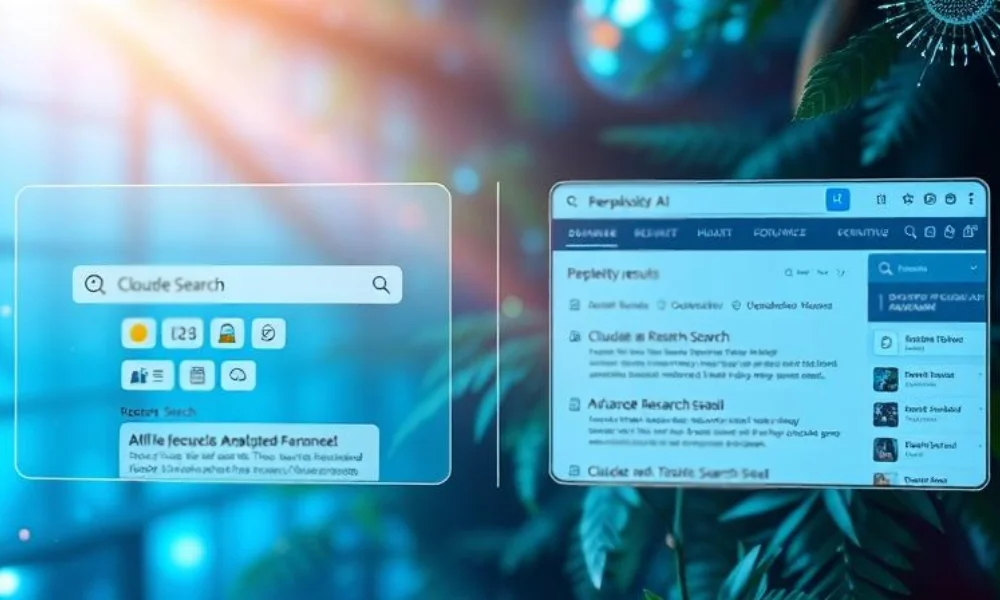Artificial Intelligence
Claude’s Web Search vs. Perplexity AI: Which One Is Smarter?
Claude Web Search and Perplexity AI are transforming how we find information online. This detailed comparison explores their accuracy, speed, usability, and the best use cases to help you choose the smarter AI search tool.

Use of AI search tools transforms my way of both seeking and handling information. The automation system expedites research along with enhancing precision by delivering instant web-based data retrieval. With smart AI tools improving daily, the battle between Claude Web Search and Perplexity AI is worth exploring.
AI Search Engine:
An AI search engine is an advanced tool that retrieves and processes web data using artificial intelligence. Unlike traditional search engines, AI-powered tools like Claude Web Search and Perplexity AI summarize information and provide direct answers.
In this article, I’ll compare Claude’s Web Search and Perplexity AI to see which one is smarter. This article evaluates differences between these technologies through a review of underlying features and response mechanics together with precision analysis and practical accessibility aspects.
What Are Claude’s Web Search and Perplexity AI?
Anthropic created Claude Web Search as their AI-powered search instrument. The system delivers GPT-4-quality responses through its ability to perform live internet searches. Using this tool enables me to obtain current news and research findings and insights from the internet as opposed to outdated information.
Perplexity AI is an advanced AI search engine designed to provide fast and reliable answers. The tool analyzes various sources before creating summaries which include proper citations for verifying accuracy. The interactive search feature of this platform allows me to modify my search terms and receive more specific results.
Key Differences in How These AI Models Work:
-
Claude Web Search: Uses natural language processing to fetch and summarize real-time web data.
-
Perplexity AI: Uses a combination of real-time crawling, citations, and interactive questioning for deeper searches.
-
Core Strengths: Claude excels in conversational AI, while Perplexity AI focuses on structured, data-backed responses.
Both AI tools are powerful, but they work differently. Understanding these differences will help me determine which one is smarter in real-world use.
How Do These AI Search Tools Work?
Claude’s Web Search and Perplexity AI use different techniques to fetch and present information. The methods used by artificial intelligence affect the way results are presented although both systems depend on AI technology. Understanding these differences helps me decide which AI search engine suits my needs better.
How Claude’s Web Search Works?
Claude Web Search enhances its responses by browsing the internet in real time. My question triggers Claude to conduct a web search for fresh data which it extracts into a concise summary. I can access current information through this method without performing manual source scanning.
The natural language processing capabilities of Claude allow it to deliver responses in conversational format. The platform provides explanations about topics through human-like descriptions. The system lacks built-in source references so users may struggle to verify information.
How Perplexity AI’s Search Works?
Perplexity AI takes a structured approach to searching the web. The system collects real-time data from sources before producing an extensive response containing references. I can easily check the sources of information through this system.
The interactive search function enables me to narrow down my queries for improved search accuracy. The system enables me to request additional information which creates a research assistant experience instead of standard search functionality.
Claude vs. Perplexity: Which One Works Better?
-
Claude Web Search: Summarizes real-time web data but lacks citations.
-
Perplexity AI: Provides source-backed answers with interactive search options.
-
Best For: Claude is better for quick, conversational responses, while Perplexity AI is ideal for fact-checked research.
Both AI search tools are powerful, but they serve different needs. Choosing between them depends on whether I prioritize speed, conversation, or accuracy.
Accuracy: Which One Provides the Most Reliable Information?
Accuracy is the most important factor when choosing an AI search engine. My priority is to obtain both speedy and scientifically valid responses. Claude’s Web Search and Perplexity AI use different methods to verify sources, which affects how reliable their responses are.
How These AI Tools Verify Sources?
Claude Web Search browses the internet in real time and summarizes the information it finds. The lack of direct source citations within the information makes it difficult for me to validate the original sources. I need to depend on Claude’s AI system to eliminate false information from its output.
Perplexity AI, on the other hand, provides direct citations for its answers. The tool retrieves data from multiple sources which it presents at the conclusion of its responses. Transparency in its search process becomes possible because I can easily fact-check claims through this tool.
Strengths and Weaknesses in Fact-Checking:
-
Claude Web Search Strengths: Fast, conversational, and capable of summarizing complex topics.
-
Claude Web Search Weaknesses: Lacks source citations, which makes verification harder.
-
Perplexity AI Strengths: Provides direct links to sources, improving trust and credibility.
-
Perplexity AI Weaknesses: Sometimes pulls outdated or lower-quality sources if not refined.
Real-World Example: Searching for Recent News
I tested both AI search tools by asking for updates on a recent tech industry merger.
-
Claude Web Search: Provided a well-structured summary but did not link back to the sources.
-
Perplexity AI: Listed key facts along with sources, allowing me to verify the claims.
For fact-checking and research, I find Perplexity AI more reliable because of its citation-based approach. However, Claude’s Web Search is still useful when I need a quick and simplified answer.
Speed: Which AI Responds Faster?
Speed is a crucial factor when using an AI search engine. The instant delivery of answers remains essential to me because I dislike waiting for lengthy periods. Both Claude’s Web Search and Perplexity AI process web data quickly, but their response times differ based on how they fetch and analyze information.
Response Time Comparison:
Claude Web Search delivers answers within seconds. The search engine performs real-time internet browsing followed by summary generation that produces results similar to human conversations. The processing of extensive data causes the system to sometimes require longer response times.
Perplexity AI is designed for speed and efficiency. The system simultaneously collects information from multiple sources before extracting needed data while providing source references. The structured system enables accurate results yet produces responses at a slower pace than Claude does.
How Quickly Each AI Fetches and Processes Results?
-
Claude Web Search: Uses a conversational approach and fetches data in real time. Processing speed depends on the complexity of the query.
-
Perplexity AI: Retrieves multiple sources, processes them, and provides citations. Its structured search method can take a bit longer.
Speed vs. Accuracy Trade-Off:
-
Claude Web Search: Prioritizes speed over verification, making it great for quick answers but less reliable for research.
-
Perplexity AI: Sacrifices a bit of speed for accuracy by ensuring sources are credible and well-documented.
If I need a fast, general answer, I prefer Claude Web Search. But if I want a well-researched response with sources, Perplexity AI is the better choice. The right AI depends on whether I value speed or accuracy more in the moment.
Response Quality: Which AI Explains Information Better?
A good AI search engine should not only provide accurate answers but also explain information clearly. I look for responses that people can easily grasp while having clear organization with enough content to serve its purpose. Claude Web Search and Perplexity AI take different approaches when summarizing complex topics.
How Well Each AI Summarizes Complex Topics?
Claude Web Search focuses on making responses feel natural and conversational. The system makes difficult information easy to understand through short explanations. The system offers excellent quick understanding because it provides plain language without technical terms.
Perplexity AI takes a more structured approach. The tool presents essential details in a understandable format. The included citations let me check sources to see if information is accurate and discover additional details. The tool gives technical responses that do not flow naturally in normal conversations.
Clarity and Readability of Responses:
-
Claude Web Search: Uses a conversational tone, making explanations feel smooth and engaging.
-
Perplexity AI: Prioritizes factual accuracy but sometimes sacrifices readability due to a more research-driven approach.
Example Comparison: Asking Both AIs a Detailed Question
I asked both AI search tools: “How does quantum computing differ from classical computing?”
-
Claude Web Search: Provided a simple, easy-to-read explanation comparing classical and quantum computing in everyday terms. It felt like talking to an expert who simplifies complex ideas.
-
Perplexity AI: Delivered a well-structured response with definitions, key differences, and sources. While informative, it felt more like reading a research paper than having a conversation.
If I want a human-like explanation, I prefer Claude Web Search. If I need a more research-focused answer with references, Perplexity AI is the better option. Choosing the right AI depends on whether I prioritize readability or depth in the response.
Citations and Source Transparency: Who Gives Better References?
When searching for information, I want to know where the answers come from. Citations help me verify facts and ensure that I’m not relying on outdated or incorrect data. Claude’s Web Search and Perplexity AI handle source transparency differently, which affects how much I can trust their responses.
Does Claude’s Web Search Cite Its Sources?
Claude Web Search browses the internet in real time but does not always provide citations. It summarizes information from multiple sources without directly linking to them. While this makes responses feel natural and conversational, it can be hard for me to fact-check or trace the original source.
Without citations, I must trust Claude’s AI to filter out misinformation. This can be a drawback when researching complex topics that require verifiable sources.
How Perplexity AI Provides Citations for Credibility?
Perplexity AI takes a more transparent approach by listing sources in its responses. After gathering data from multiple websites, it includes citations, allowing me to click on the original links for further reading. This improves credibility and helps me verify claims.
The citation system makes Perplexity AI ideal for research-heavy tasks where I need to cross-check facts. However, sometimes it pulls sources from lower-quality sites, so I still need to evaluate the credibility of each reference.
Why Source Transparency Matters for Users?
-
Trust and Credibility: Cited sources make it easier to verify facts and avoid misinformation.
-
Fact-Checking: Users can cross-check answers with original sources for accuracy.
-
Deeper Research: Clicking on references helps users explore topics in more detail.
If I need a casual, easy-to-read summary, I prefer Claude Web Search. But when accuracy and source verification matter, Perplexity AI is the better option. Citations give me confidence in an AI’s response, making source transparency a key factor when choosing between these two search tools.
Usability: Which AI Is More User-Friendly?
A good AI search engine should be easy to use, whether I’m casually looking up information or conducting in-depth research. Claude’s Web Search and Perplexity AI have different interfaces and usability features, which affect who benefits the most from each tool.
Interface Design and Ease of Use:
Claude Web Search has a clean, minimalistic interface that feels like chatting with an assistant. The conversational style makes it easy for me to ask follow-up questions and refine my search without starting over. However, the lack of visible citations means I sometimes need to double-check information elsewhere.
Perplexity AI offers a more structured interface. It presents results in a research-oriented format, with citations listed clearly. While this makes fact-checking easier, the interface can feel slightly overwhelming if I just want a quick, simple answer.
Who Benefits More – Researchers, Students, or Casual Users?
-
Researchers: Perplexity AI is better because of its structured responses and source citations.
-
Students: Claude Web Search is ideal for learning because it explains topics in an easy-to-understand way.
-
Casual Users: Claude is better for quick searches, while Perplexity is useful when accuracy matters.
Mobile and Desktop Experience Comparison:
Both AI tools work well on mobile and desktop, but they offer different experiences:
-
Claude Web Search: Works smoothly on both devices, but the chat-style interface is more comfortable on mobile.
-
Perplexity AI: Performs well on both platforms, with its research-driven format being easier to navigate on a desktop.
If I want a smooth, conversational experience, I prefer Claude Web Search. But if I need a structured, research-friendly tool, Perplexity AI is the better choice. The right option depends on how I plan to use the AI search engine.
Customization: Which AI Allows More Personalization?
A smart AI search engine should adapt to my needs, allowing me to refine results and interact naturally. Claude’s Web Search and Perplexity AI offer different levels of customization, affecting how much control I have over my searches.
Can Users Refine Their Search Results?
Claude Web Search provides a conversational approach, letting me refine my queries by asking follow-up questions. While it adjusts responses based on context, it does not allow direct filtering or advanced search settings.
Perplexity AI offers more control by allowing users to refine searches with specific keywords and filters. Since it cites sources, I can explore original links for more details, making it easier to dive deeper into topics.
Features Like Follow-Up Questions and Interactive Search:
-
Claude Web Search: Allows me to continue conversations, making search results feel more personalized. However, it does not provide direct search filters.
-
Perplexity AI: Supports interactive search with citations and multiple perspectives. It also lets me choose different search modes, making it more flexible.
Which AI Adapts Better to User Needs?
-
Claude Web Search is better for casual users who prefer a natural, chat-like experience. It adjusts responses based on previous questions but lacks direct customization options.
-
Perplexity AI is ideal for those who need structured research. Its ability to refine searches, provide citations, and offer multiple viewpoints makes it more adaptable for in-depth queries.
If I want a seamless, conversational search experience, I prefer Claude Web Search. But if I need more control over how I explore information, Perplexity AI offers better customization.
Privacy and Security: Which AI Protects User Data Better?
When using an AI search engine, I want to know how my data is handled. Privacy and security are crucial, especially when searching for sensitive information. Claude’s Web Search and Perplexity AI have different approaches to data protection, affecting how safe my searches are.
Data Handling Policies of Claude’s Web Search vs. Perplexity AI:
Claude’s Web Search, developed by Anthropic, follows strict privacy policies. It avoids storing detailed user interactions and limits data retention. This means my queries are less likely to be used for AI training or advertising purposes.
Perplexity AI, on the other hand, collects user data to improve search accuracy. While it prioritizes transparency, it may store search queries for analysis. This helps refine responses but raises concerns about long-term data storage.
Does Either AI Track or Store User Queries?
-
Claude Web Search: Focuses on user privacy and minimizes query storage. It does not track users for targeted ads.
-
Perplexity AI: Collects queries for search optimization. While it provides transparency, some users may prefer more privacy.
How They Compare to Traditional Search Engines Like Google?
-
Google collects vast amounts of user data, tracking search history for ad targeting and personalized results.
-
Claude Web Search is more privacy-focused, limiting long-term tracking and user profiling.
-
Perplexity AI balances transparency and data collection, offering citations but potentially storing search history for AI training.
If I prioritize privacy, Claude Web Search is the safer choice. However, if I want more detailed responses with citations, Perplexity AI provides a richer experience—though with some data tracking.
Real-World Use Cases: When to Use Claude vs. Perplexity AI?
Choosing the right AI search engine depends on what I need. Some tasks require detailed research, while others just need quick answers. Here’s when I should use Claude’s Web Search or Perplexity AI based on real-world use cases.
Best AI for Academic Research:
Perplexity AI is the better choice for research. It provides citations, structured responses, and multiple perspectives. When I need to verify facts or find scholarly sources, Perplexity’s transparency helps me trust the information.
Best AI for Real-Time News Updates:
Claude’s Web Search works well for staying updated with current events. Its ability to browse the web and summarize news quickly makes it ideal for breaking news. However, since it doesn’t always provide citations, I may need to double-check sources.
Best AI for Casual Browsing and Quick Answers:
If I want simple explanations without too much complexity, Claude is the better option. It provides clear, conversational responses, making it great for general knowledge searches. Perplexity AI is better when I need verifiable information, but it might feel too structured for quick browsing.
Conclusion:
Both AI tools have their strengths and weaknesses. Claude’s Web Search is more conversational and easy to use, but it lacks citations. Perplexity AI provides accurate, well-referenced information, but its structured approach may feel overwhelming.
Final Verdict: Which AI Is Smarter for Different Users?
-
For students and researchers: Perplexity AI is smarter because of its citations and fact-checking.
-
For casual users and quick searches: Claude’s Web Search is better for fast, easy-to-read answers.
-
For news updates: Claude is better for summarization, while Perplexity is more reliable for verifying sources.
Both AI search engines have unique advantages, but the smarter choice depends on what I need. Which AI do you think fits your needs best? Let me know in the comments!
-

 Artificial Intelligence8 months ago
Artificial Intelligence8 months agoWhat is Artificial Intelligence? A Comprehensive Guide for Businesses and Enthusiasts
-

 Artificial Intelligence6 months ago
Artificial Intelligence6 months agoHow to Use Grok AI: A Complete Guide
-

 Artificial Intelligence8 months ago
Artificial Intelligence8 months agoUnlocking the Power of Artificial Intelligence Tools
-

 Artificial Intelligence7 months ago
Artificial Intelligence7 months agoWhat is DeepSeek? Revolutionizing AI with Cutting-Edge Solutions
-

 Artificial Intelligence3 months ago
Artificial Intelligence3 months agoAI Technologies in Warehouse Automation:
-

 Artificial Intelligence4 months ago
Artificial Intelligence4 months agoMeta’s AI Push: The Standalone Assistant App Set to Rival ChatGPT
-

 Artificial Intelligence3 months ago
Artificial Intelligence3 months agoHow Artificial Intelligence is Revolutionizing Logistics:
-

 Artificial Intelligence3 months ago
Artificial Intelligence3 months agoPredictive Analytics for Demand Forecasting:


